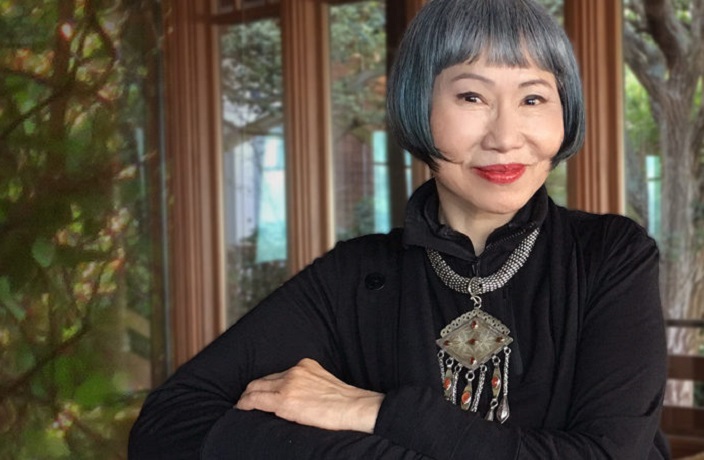This is part of our series of interviews with some of the speakers at the 2017 Shanghai International Literary Festival.
Ever since her award-winning debut The Joy Luck Club stampeded onto the New York Times bestseller list for an impressive 77 weeks, Amy Tan has loomed as the biggest Asian-American literary voice. Speaking from her San Francisco home, the 64-year-old chuckles at her hallowed status.
“I get referred to as some kind of historical figure,” she jokes, before dramatically dropping her voice to say, “back in the ancient days of early Asian-American literature…”
While The Joy Luck Club and its subsequent 1993 film adaptation were commercial successes notable for showing there was a market for Asian-American stories, Tan has also become a figure whose tropes other Asian-American writers rebel against.
“Some people condemn my writing and say, ‘She’s writing about the past, which is not what we are about,’ whereas others say, ‘She opened the door to our being able to do this,’” Tan says.
“I take credit for neither one. I was just doing what I wanted to do with my own writing. If I opened doors, great – I don’t take credit for it. If it makes people feel that the past is being too honored, then go write a book that brings Asian-American literature to the future.”
She notes that her style is rooted in her experience as an American-born daughter of two Chinese immigrants who fled the country during the Chinese Civil War.

“When I was a kid, I never wanted to know anything about China and my parents never really talked to us about China. It was within 10 years of the war and people were still pretty racist and paranoid about Communist China. As kids, people would call you terrible names,” she says.
“It wasn’t until I was much older that I started hearing over the years obliquely about that man – and my mother’s arranged marriage and her three daughters [in Shanghai].”
Her mother’s experience inspired The Joy Luck Club, which was also spurred on by Tan’s first visit to Shanghai, two years prior to the book’s release.
“It was 1987, so women were still wearing blue pant suits and short hair. I thought I was going to blend in, but there were people crowded around me saying, ‘Oh, she’s weird looking,’” she chuckles.
“My mom said, ‘You don’t even belong here. They can tell by the way you look, the way you talk and everything about you that you are American, you’re not Chinese.’ It was like a disappointment, because I really wanted to be Chinese.”
Tan laughs at her youthful woe and has since visited Shanghai about 15 times over the past 30 years. “The city morphs every six months, so it’s always dramatic and surprising,” she says.
“Yet, what fascinates me about it is its past, which also includes my mother because that’s where she grew up. While she was dirt poor in America, she was once a socialite in Shanghai.”
Tan adds, “Shanghai has always been incredibly avant-garde, fashionable and had this society where people are way up there in impossible ways, and people that are way down there. That’s interesting to see, just in the historical context of mother’s life.”

The city’s rich past was the inspiration for Tan’s 2013 novel, The Valley of Amazement. Inspired by a photo of a courtesan in 1910 Shanghai who “was wearing the exact same thing as my grandmother in my
favorite photo of her,” she admits. “I never imagined I would ever write a story about a courtesan – it seemed so clichéd and potboiler romance stuff.”
Inquiries into details of the photo led to extensive research of the era’s courtesans, fashion and social structure. “I had to be in that world full-time,” Tan explains. “After a while, you just have to write even if you sense what the criticism could be.”
The writing process is the subject of Tan’s upcoming book, Where the Past Begins, that is tentatively scheduled for an October release. She describes it as “an accidental book” – a memoir inspired by going through boxes of family memorabilia.
“It’s the underside of the mothers of The Joy Luck Club stripped away and not looking so great,” Tan says. “It shows the kind of emotional trauma in [my mom’s] life and how that was handed to me, which became something I had to deal with.”
“It’s not about the details; it’s about the imagination. It’s not about making something up; it’s about taking something that’s from the depths of who you are, and finding these things that are almost like repressed memory and going, ‘Oh, that’s how my imagination works.’ That’s what I do with fiction.”
While she’s currently doing revisions – a result of changing her writing process to submit one piece a week to her publisher – Tan says she will preview Where the Past Begins during her Shanghai Literary Festival appearances on March 11-12.
She’s also been using her voice in other ways, recently appearing at the San Francisco Women’s Day March following President Donald Trump’s inauguration. Tan admits Trump’s immigration policies strike close to her heart due to her family’s personal experiences.
“We were illegal immigrants who faced the possibility of being deported for 10 years,” she says. “There’s this great fear that your life – one that you are still creating – is going to be taken from you in an instant.”
Mar 11, 4pm, RMB85, Mar 12, noon, RMB85. See listing for Glam, Tickets available at their website.
The Shanghai International Literary Festival returns to M on the Bund from March 10-22, bringing together authors of all stripes. This is part of our series of interviews with some of the speakers at the 2017 Shanghai International Literary Festival. View the full schedule here.






















0 User Comments